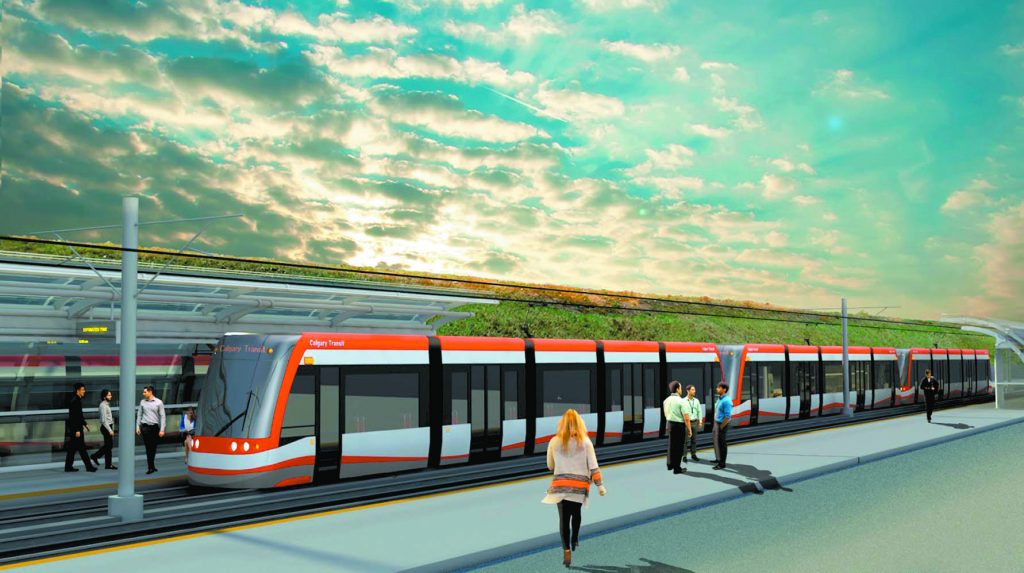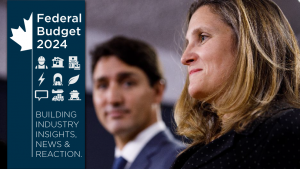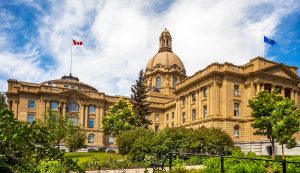The Alberta government’s 2018 budget pledge of $1.53 billion for light rapid transit (LRT) systems in Edmonton added another multi-billion transit project into Western Canada, increasing the value of looming LRT contracts to a hefty $13 billion.
Edmonton, Calgary, and Vancouver all have LRT projects slated that will collectively roll out construction between 2019 and 2020 bringing thousands of man-hour jobs into the construction industry. The spin-off effect is also expected to create millions of dollars in new building construction.
Edmonton is racing its rails forward. The $1.53 billion earmarked for Edmonton triggers the first step of the procurement processes, which will begin in mid-2018, for the city’s largest LRT project, the Valley West Line with construction expected to start in 2019.
“We have fallen behind in our development of rapid transit and we are still behind,” said Andrew Knack, Edmonton councillor.
Knack heads this transit initiative for the Alberta capital. Edmonton was one of the first cities in Western Canada to develop transit 40 years ago but then LRT planning faltered. In 2008, efforts rekindled and building began. The city’s routing for rapid transit has been like a hub and spoke pattern connecting communities to downtown and also connecting the spokes to one another. Plans also include providing better downtown alignments.
Edmonton has two LRT projects ready to begin: the Valley West Line and the Metro Northwest Line running from the Northern Alberta Institute of Technology (NAIT) to Blanchard.
Knack said the provincial funding — along with other federal government — will provide the needed dollars to begin immediately with the Valley West Line and also begin bringing the Metro West Line closer to construction as well. He said there is also enough funding available to start planning the expansion of other LRT legs.
The original intent of the LRT, Knack said, was as a people mover. But, that intent has now been diversified as council has realized new community opportunities.
“The number one criterion has become the redevelopment of mature communities,” he said as LRT will bring more people to outlier city areas. Greater population in these areas will lead to enhanced facilities, housing, and service construction and a revitalization of these older areas.
The Valley Line LRT consists of 27 kilometres of low-floor (street level) line with urban-styled vehicles running on streets and able to adhere to traffic stops. It will operate from Mill Woods in the southeast Edmonton to Lewis Farms in west Edmonton. It is being built in two phases — southeast and west.
The 13-kilometre long Valley Line Southeast has 11 stations and is being delivered by a public-private partnership (P3). In 2016, TransEd Partners was selected to complete design, build, operate and maintain the $1.8 billion line with a completion date of 2020 year-end. The TransEd Partners is composed of Bechtel, EllisDon, Bombardier, and Fengate Capital Management Ltd., plus expertise from Arup Canada and IBI Group.
Building the core of the Green Line LRT is essential to supporting Calgary’s growth
— Mac Logan
City of Calgary
The west portion (102 Street downtown and Lewis Farms Transit Centre) that Knack wants out to tender by summer was originally estimated at a cost of $1.8 billion. However, a report to council estimated that the cost could raise to $2.4 billion depending upon the number of stations and their grade separations from street level. Council is still fine-tuning the stations locations.
“I think we will come in at around $2 billion,” Knack estimates.
Knack said the council will also have to decide whether to pursue a P3 route or another delivery methods such as design-build. But, he wants the city to move on it.
“We would like to go to tender this summer,” he said, with council able to chose a successful proponent for construction starting in 2019.
He said there are other details to be considered before posting the project’s tender as there is nothing to preclude TransEd Partners from bidding on the other leg of the line. But, at the same time, council will have to ensure that there is no unfair advantage and all bidders are operating with the same cost information regarding the new expansion.
At Lewis Farms a new community centre is also being planned a short shuttle bus ride from the new station. “It is going to be a major construction project and it is long over-due for the community,” he said. Council is hoping to wrap up the final designs of the new centre later this year and approve them. The tender for the new community centre is expected to go out in mid-2019.
Edmonton’s Metro Line consists of two segments: Metro Line North which runs from Churchill to the NAIT and was completed in 2015 and the yet to be built Metro Line Northwest. The first phase of the Metro Line Northwest begins with a new station at NAIT but initially will only go as far as Blatchford.
Blatchford contains the old City Centre Airport lands which the city is redeveloping into a 535-acres mini-city with high-density housing to accommodate 30,000 new residents. There will be no single detached housing in the community, which will also have an 80-acre park and other community and commercial facilities. The city has been working placing infrastructure and roads onto the site. Knack said the council is discussing how the Metro Line Northwest can work in to the city’s Blatchford project as there is the money to build that extension. The city estimates the cost at $324 million based upon the 2013-2014 Concept Planning Report. Metro Line Northwest is in the concept phase which includes public engagement that’s fully integrated into the planning process for concept validation and preliminary engineering.
Knack said the 2018 rapid transit grant by the provincial government matches what was given Calgary in 2017 for its Green Line LRT.
Calgary’s Green Line is 46 kilometres in length and was approved by Calgary council in 2017. The first phase of the Green Line is 20 kilometres (with 14 stations) and budgeted at $4.65 billion and runs from 16 Ave. North to 126 Avenue S.E.
While the Alberta government has pledged $1.53 billion, the city is also raising $1.53 billion and another $1.53 billion has come from the federal government. It is considered the largest capital expenditure project in Alberta. Construction is expected to begin in 2020, however, Calgary has secured $250 million to do pre-construction work along the route. There are approximately 20 projects along the route that have either been started or will begin in 2018. Project information is available on the city’s website).
“Building the core of the Green Line LRT is essential to supporting Calgary’s growth,” said Mac Logan, Calgary’s general manager of transportation.
“In building this complex piece of the project first, we will be well positioned to expand the line in affordable, incremental pieces as more funding becomes available.”
In the 10 years leading up to opening day, the first 20-kilomtres is estimated to create more than 12,000 direct construction jobs, the city estimates. A Request for Qualifications is expected to be released in third quarter 2018 after a delivery model has been decided. A Request for Proposals is expected by first quarter 2019.
Not to be out-done, Metro Vancouver’s Mayors Council recently put together and obtained B.C. government approval for a funding formula yielding $2.5 billion (a combination of development charges, property taxes, fare increases and added parking revenue) for the second phase of its transit plan expected to cost $7 billion. The yield will fulfill the region’s obligation to private 20 per cent of funding for the second phase plan with both the provincial and federal government pledging 40 per cent last year.
Under the second phase plan, Metro Vancouver will build the Surrey-Newton-Guildford and the Millennium Line Broadway extension and upgrade the existing Expo-Millennium line to increase capacity. According to TransLink’s website construction is expected to start in 2019.











Recent Comments
comments for this post are closed